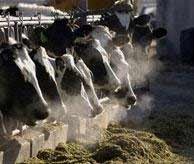This is the VOA Special English Agriculture Report.
Experts say that agriculture provides 14 percent of the world's greenhouse gas emissions each year. The gases released include carbon dioxide, a major cause of global warming.
Twenty-one nations around the world recently joined forces to better understand and prevent greenhouse gas emissions from farms. The Global Research Alliance on Agricultural Greenhouse Gases was launched at the United Nations conference on climate change.
The meeting took place in Copenhagen, Denmark last month.

Agricultural experts blame a number of farm activities for producing greenhouse gases. For example, animal waste and cattle digestive systems release methane gas. Fertilized soil and the burning of crop waste also release harmful gases into the air. Experts say some methods of tilling -- turning the soil to prepare for planting – also release harmful carbon dioxide.
An official of the European Commission's Directorate General for Research says agricultural greenhouse gas emissions can be cut. Maive Rute suggests feeding animals a diet designed to reduce emissions.
The new agricultural research group says protecting against global warming is only part of its purpose. It says the world also needs to develop better farming methods to feed growing populations in poor countries.
United States Agriculture Secretary Tom Vilsack said no one single nation can fight agricultural greenhouse gas emissions and increase food production at the same time. This is why the alliance is important for combining resources and finding new ones.
The United States Department of Agriculture will increase spending on farm emissions research by 90 million dollars over the next four years. The total will reach 130 million dollars. The U.S.D.A. will share the research with other countries in the Global Research Alliance on Agricultural Greenhouse Gases.
The U.S.D.A. will support researchers from developing countries that belong to the alliance. Money from the Borlaug Fellowship program will let the researchers study agricultural climate change with American scientists.
Mr. Vilsack said that just as climate change has no borders, there should be no borders for research.
And that's the VOA Special English Agriculture Report, written by Jerilyn Watson. You can comment on our programs at voaspecialenglish.com. I'm Steve Ember.
UN envoy: Climate change talks moving forward
(來(lái)源:VOA 編輯:陳丹妮)
